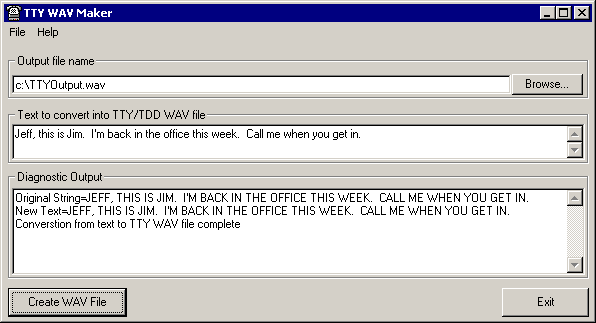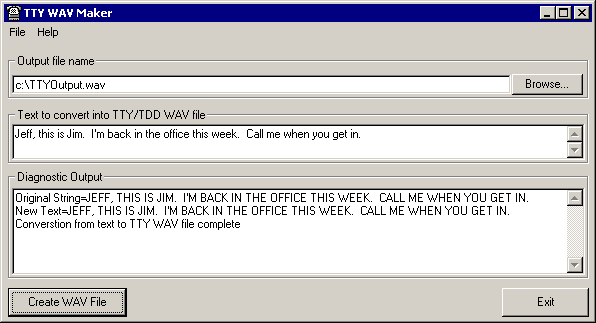Overview
TTY WAV Maker is a tool that translates text into WAV files that can be played to TTY/TDD phone devices. It’s designed for being able to quickly generate TTY WAV files that can be used as voice mail messages from the user’s desktop.

When the text is converted into TTY tones stored in the wav file selected, it’s also copied to the clipboard. This makes it easier to paste the contents into a voice mail control or as an attachment to an email if desired.
This tool is designed to be used in conjunction with the TTY WAV Reader application which can pull text from a TTY WAV file out. You can find TTY WAV Reader’s home page here: www.CiscoUnityTools.com\App_TTYWAVReader.htm
You can also use TTY Angel to construct TTY WAV files in batch from CSV or from standing Unity prompt sets. TTY Angel has all the functionality of TTY WAV Maker but also includes features such as customizable dictionaries for word/phrase replacement, support for batch operations and constructing TTY WAV file alphabets using different speeds than the standard 45.45 baud. You can find TTY Angel’s home page here: www.CiscoUnityTools.com\App_TTYAngel.htm
Requirements/Special Notes
TTY WAV Maker cannot be run over a WTS connection. Since it interacts with the WAV driver to get it’s job done and WTS does not like applications doing this remotely, TTY WAV Maker will not allow itself to run if it detects it’s launched from over a WTS connection.
TTY WAV Maker is not specific to any Unity version or the like. It generates WAV files that can be understood by TTY phone devices.
TTY WAV Maker will produce WAV files that can be played back an “understood” by any device compatible with the Baudot protocol. This is the standard protocol used by all TTY/TDD phone devices in North America. The US standard is for transition speeds of 45.45 baud which is what TTY WAV Maker uses by default.
While some TTY/TDD phone devices support the newer ASCII protocol at 110 or 300 baud speeds, TTY WAV Maker does not support this since these are two way modem protocols that cannot transmit using simple asynchronous WAV file transmissions.
I have tested the TTY WAV Maker output against several TTY/TTD phones and software packages that use standard PC modems to emulate TTY/TDD phone devices and found it to work well with all equipment. One thing to note, however, is that some phones treat the # (pound) and ‘ (single quote) characters differently and map them to different values. I have used the most up to date specifications I could find and tested it against the latest Ultratec phones to verify the output from TTY WAV Maker is accurate.
Using TTY WAV Maker
The most common way to use TTY WAV Maker is to simply select a WAV file path for output and type in text you want translated and have the output saved to the designated WAV file. This what’s shown in the overview screen shot above. The resulting WAV file is also copied to the clipboard in addition to being stored in the file designed on the form. Typically you paste these WAV files into the voice mail or IVR application in a method provided by the manufacturer. In the case of Unity this is done via the VMO interface using the media master control using the “Paste” (for the clipboard) or “Paste from file…” (to use a file on the hard drive) options in the drop down control on the left as shown here:

You can use this mechanism for constructing messages for TTY users to receive on their TDD phone devices quickly and easily. Of course it’s also possible to simply use TRAP (telephone record and playback) and call a TTY/TDD phone device and just record the tone output while typing, however this is much more time consuming and error prone than using the TTY WAV Maker application.
Obtaining Updates
Updates to this and all other Unity tools can be found at www.CiscoUnityTools.com
If you have questions, comments or suggestions about this or any other tools found on CiscoUnityTools, feel free to visit the Unity Forum.
Revision History
Version 1.0.6 – 10/23/2004
- Added support for inserting 180 ms “blank character” WAV files into the TTY output using the “~” character. This is used for automated testing purposes.
Version 1.0.5
- Added localization support for resource strings and help file
Version 1.0.2
- Fixed problem with long file names/paths on the output file selected causing problems.
- Updated help file with edits
- Adjusted diagnostic output to remove unsupported characters as appropriate
- Adjusted tab order and added shortcut keys for buttons on form
- Fixed problem where unnecessary transition to LTRS mode was being added when invalid characters were encountered
Version 1.0.1
- First release of tool – simplified version of TTY WAV Maker.
© 2003 Cisco Systems, Inc. -- Company Confidential